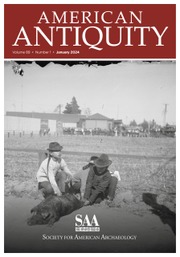With this issue, I take on the editorship of American Antiquity (AAQ). And I do so at a time of cautious optimism regarding the pandemic and climate change while still in the thick of the significant social and political movements of the last few years—such as Black Lives Matter and #MeToo. Yet, there is unease about our futures, especially among the younger generation of archaeologists who in some cases have seen their workload increase while their salary, grants, and publishing opportunities have decreased. As Lynn Gamble, the outgoing editor, stated in her final Editor's Corner piece (Reference Gamble2021), the discipline of archaeology is relevant to so many of the world's pressing problems. The last issue under her watch was particularly chock full of important pieces on antiracism, sexual harassment, and climate change.
Lynn guided AAQ through some very turbulent times with a sure hand and a visionary outlook, coauthoring along with her entire advisory board a profoundly important piece on archaeological perspectives on pandemics (Gamble et al. Reference Gamble, Claassen, Eerkens, Kennett, Lambert, Liebmann and Lyons2021). She kept a keen eye out for important panels and symposia, and she invited these to become forum pieces and contributions. She also courted early career BIPOC and LGBTQIA+ scholars to consider publishing in AAQ. She kept a fierce focus on gender equity in publishing and did an in-depth inquiry into why submissions to AAQ lean toward male authors. All of these initiatives that Lynn started will continue to take up my efforts and time as well.
Although we want to save the world with our archaeological insights into pandemics, migration, climate change, food insecurity, and warfare, we also need to save ourselves. Younger voices in our membership have expressed outrage, despair, and frustration with the lack of attention and oversight into the problems of doing archaeology in today's social and political climate. Rampant harassment in the form of come-ons to and put-downs of females in our profession, which by all accounts is ubiquitous (see Voss Reference Voss2021a, Reference Voss2021b), is just one lens through which to ponder the problems in our discipline. Another lens through which to examine problems facing archaeology include the ethics and morality of how we obtain, analyze, curate, and work with sacred items, burials, and objects of patrimony that have regionally specific historical and contemporary trajectories related to museums and repositories. Other problems facing our discipline include the underlying racism and racist actions in how BIPOC scholars are treated and the myriad of ways that they experience transgressions in academia, in nonacademic positions, and in the field.
Websites detailing various complaints and a desire to have a new kind of organization at the helm have popped up and found ready followers. Change is afoot, but there are still many younger colleagues who have either never been members of the Society for American Archaeology (SAA) or have ceased paying their dues. Given my desire to address this loss of potential SAA members—who I hope would make AAQ their journal of choice—I have been happily overwhelmed with the energy and enthusiasm of the new editorial board, which sees this as one of its goals. Among those on the editorial board are individuals who have published and spoken publicly on ways to make the SAA, AAQ, and archaeology in general more diverse, inclusive, and equitable.
We know that research and publishing right now are neither diverse nor equitable, and they do not feel welcoming to many whose identities within archaeology have been marginalized. BIPOC scholars make up less than 15% of PhDs nationwide. The publishing culture is largely seen as arbitrary, opaque, sexist, and racist. Yet, studies have revealed that ethnic diversity in publishing increases the scientific impact journal articles have and that when papers are authored by ethnically diverse authors, they are cited more frequently (AlShebli et al. Reference AlShebli, Rahwan and Woon2018).
Some concrete steps that we will be taking in the future are to publish a diversity, equity, and inclusion statement for AAQ and to also make available very clear and encouraging guidelines for both authors and reviewers. We will be providing more transparent advice and best practices for reviewers while also building and relying on a more diverse reviewer base. We want to provide guidance to authors regarding how and to whom acknowledgments are made, as well as how authorship order is determined.
All of the excellent articles in this issue were vetted by Lynn Gamble, and there is likely something here for everyone. Our current book reviews editor, Chris Rodning, will continue on in his role, and he has gathered an interesting set of reviews for this issue. Please do contact me via e-mail ([email protected]) if you have any queries, concerns, ideas, or suggestions.


